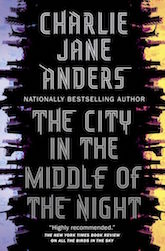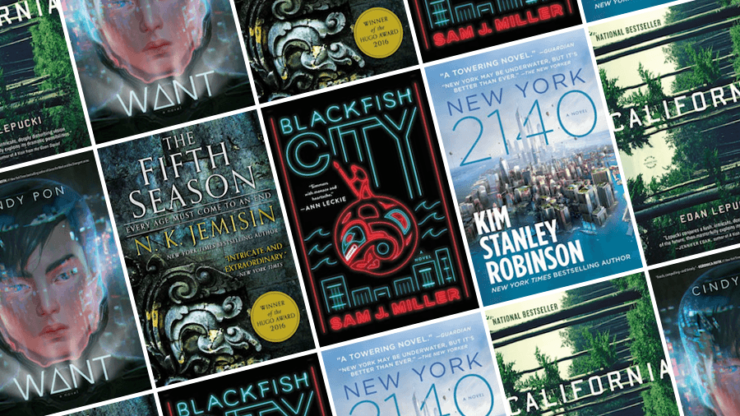The future is arriving sooner than most of us expected, and speculative fiction needs to do far more to help us prepare. The warning signs of catastrophic climate change are getting harder to ignore, and how we deal with this crisis will shape the future of humanity. It’s time for SF authors, and fiction authors generally, to factor climate change into our visions of life in 2019, and the years beyond.
The good news? A growing number of SF authors are talking about climate change overtly, imagining futures full of flooded cities, droughts, melting icecaps, and other disasters. Amazon.com lists 382 SF books with the keyword “climate” from 2018, versus 147 in 2013 and just 22 in 2008. Some great recent books dealing with the effects of environmental disasters include Sam J. Miller’s Blackfish City, Edan Lepucki’s California, Cindy Pon’s Want, Kim Stanley Robinson’s New York 2140, and N.K. Jemisin’s Broken Earth trilogy. It’s simply not true, as Amitav Ghosh has suggested, that contemporary fiction hasn’t dealt with climate issues to any meaningful degree.
But we need to do more, because speculative fiction is uniquely suited to help us imagine what’s coming, and to motivate us to mitigate the effects before it’s too late.
Climate change “no longer seems like science fiction,” Robinson recently wrote. And in many ways, this seemingly futuristic nightmare is already upon us. The rate of melting in Antarctica’s ice sheet has gone up by 280 percent in the past 40 years, and the oceans are warming faster than predicted. Already, there are wildfires and abnormally destructive storms in the United States—but also, widespread famine in East Africa and the Sahel region, as rains become erratic and crucial bodies of water like Lake Chad shrink. Millions of lives are already threatened, and even the current federal government predicts it’s going to get scarier.
“I live in New York City, and I’m scared shitless about how climate change is already impacting us here, and how much worse it will get,” says Blackfish City author Miller. “We still haven’t recovered from the damage Hurricane Sandy did to our subway tunnels in 2012. And I’m infuriated at the failure of governments and corporations to take the threat seriously.”
Jemisin says that she didn’t set out to create a metaphor for climate change in the Broken Earth trilogy, but she understands why so many people have viewed it as one. “I get that it works as a metaphor for same, especially given the revelations of the third book, but that just wasn’t the goal,” she says. Even so, Jemisin says that she believes “anyone who’s writing about the present or future of *this* world needs to include climate change, simply because otherwise it’s not going to be plausible, and even fantasy needs plausibility.”
It’s become a cliché to say that science fiction doesn’t predict the future, but instead just describes the present. At the same time, because SF deals in thought experiments and scientific speculation, the genre can do more than any other to help us understand the scope of a problem that’s been caused by human technology, with far-ranging and complicated effects.
Science fiction “provides a remarkable set of tools” for exploring intricate systems such as the atmosphere, ecosystems, and human-created systems, says James Holland Jones, an associate professor for Earth System Science and Senior Fellow at the Woods Institute for the Environment at Stanford University. “These are all complex, coupled systems. Tweak something in one of those systems and there will be cascading, often surprising, consequences.” A science fiction novel provides a perfect space to explore these possible consequences, and what it might be like to live through them, Jones says.
“I think that this modeling framework is just as powerful as the mathematical models that we tend to associate with the field” of environmental science, Jones adds. “SF allows the author—and the reader—to play with counterfactuals and this allows us to make inferences and draw conclusions that we otherwise couldn’t.”
We need to imagine the future in order to survive it
And any real-life solution to climate change is going to depend on imagination as much as technical ingenuity, which is one reason why imaginative storytelling is so vitally important. Imagination gives rise to ingenuity and experimentation, which we’re going to need if humans are going to survive the highly localized effects of a global problem. Plus imagination makes us more flexible and adaptable, allowing us to cope with massive changes more quickly.
Jones cites a 2016 interview with Mohsin Hamid in The New Yorker in which Hamid says that our political crisis is caused, in part, by “violently nostalgic visions” that keep us from imagining a better future.
Says Jones, “I think it’s hard to overstate how important this is. We are actively engaged in a struggle with violently nostalgic visions that, like most nostalgia, turn out to be dangerous bullshit.” Science fiction, says Jones, can show “how people work, how they fight back, how they engage in [the] prosaic heroism of adapting to a changed world. This is powerful. It gives us hope for a better future.”
And that’s the most important thing—solving the problem of climate change is going to require greater political willpower in order to overcome all the bullshit nostalgia and all of the entrenched interests that profit from fossil fuels. And empathizing with people who are trying to cope with the effects of climate change is an important step toward having the will to act in real life.
“To me, it’s the job of a science fiction writer—as it’s the job of all sentient beings—to not only stand unflinchingly in the truth of who we are and what we’re doing and what the consequences of our actions will be, but also to imagine all the ways we can be better,” Miller says.
And it’s true that there’s no version of Earth’s future that doesn’t include climate change as a factor. Even if we switch to entirely clean energy in the next few decades, the warming trend is expected to peak between 2200 and 2300—but if we insist on burning every bit of fossil fuel on the planet, the trend could last much longer (and get much hotter.) That’s not even factoring in the geopolitical chaos that’s likely to result, as whole populations are displaced and/or become food-insecure.
So any vision of a future (or present) world where climate change is not an issue is doomed to feel not just escapist, but Pollyannaish. Even if you decide that in your future, we’ve somehow avoided or reversed the worst effects of climate change, this can’t just be a hand-wavy thing—we need to understand how this solution happened.
Heroes, and reason for hope
Science fiction, according to Jones, provides an important forum for “humanizing science and even politics/policy.” Pop culture and the popular imagination tend to depict scientists as evil or horribly misguided, and civil servants as “contemptible, petty, power-hungry bureaucrats.” But SF can show science in a more positive light, and even show how government is capable of implementing policies that “will get us out of the mess we’re currently in,” says Jones.
“With Blackfish City, I wanted to paint a realistically terrifying picture about how the world will change in the next hundred years, according to scientists,” says Miller—a picture which includes the evacuation of coastal cities, wars over resources, famines, plague, and infrastructure collapse. “But I also wanted to have hope, and imagine the magnificent stuff we’ll continue to create. The technology we’ll develop. The solutions we’ll find. The music we’ll make.”
“The Road/Walking Dead-style abject hopelessness is not entertaining or stimulating to me,” adds Miller. “Humans are the fucking worst, yes, but they’re also the fucking best.”
Buy the Book


The City in the Middle of the Night
Robinson has been called the “master of disaster” because of how often he depicts a world ravaged by climate change, in books ranging from the Science in the Capitol trilogy to the more recent New York 2140. But Jones says Robinson’s novels “are generally incredibly hopeful. People adapt. They fight back. They go on being human. They work to build just societies. And the heroes are just regular people: scientists, public servants, working people.”
Jones also gains a lot of hope from reading Octavia Butler’s Parable of the Sower, with its “visceral exploration of human adaptation.” He also cites the novels of Margaret Atwood and Paolo Bacigalupi, along with Barbara Kingsolver’s Flight Behavior, Richard Powers’ The Overstory, and Hamid’s Exit West. (I’ve also done my best to address climate change, in novels like All the Birds in the Sky and the forthcoming The City in the Middle of the Night, plus some of my short fiction.)
Speculative fiction has done a pretty good job of preparing us for things like social media influencers (see James Tiptree Jr.’s “The Girl Who Was Plugged In”) or biotech enhancements. But when it comes to the greatest challenge of our era, SF needs to do much more. We’re not going to get through this without powerful stories that inspire us to bring all of our inventiveness, far-sightedness, and empathy to this moment, when the choices we make will shape the world for generations.
So if you’re writing a near-future story, or even a story set in the present, you have an amazing opportunity to help transform the future. Even if you don’t want to write a story that’s explicitly about climate change, simply including it in your worldbuilding and making it a part of the backdrop for your story is an important step towards helping us see where we’re headed, and what we can do about it. In fact, in some ways, a fun, entertaining story that just happens to take place in a post-climate change world can do just as much good as a heavier, more serious piece that dwells on this crisis. And really, we need as many different kinds of approaches to climate issues as possible, from hard-science wonkery to flights of fancy.
Few authors, in any genre, have ever had the power and relevance that SF authors can have in 2019—if we choose to claim this moment.
Charlie Jane Anders’ latest novel is The City in the Middle of the Night. She’s also the author of All the Birds in the Sky, which won the Nebula, Crawford and Locus awards, and Choir Boy, which won a Lambda Literary Award. Plus a novella called Rock Manning Goes For Broke and a short story collection called Six Months, Three Days, Five Others. Her short fiction has appeared in Tor.com, Boston Review, Tin House, Conjunctions, The Magazine of Fantasy and Science Fiction, Wired magazine, Slate, Asimov’s Science Fiction, Lightspeed, ZYZZYVA, Catamaran Literary Review, McSweeney’s Internet Tendency and tons of anthologies. Her story “Six Months, Three Days” won a Hugo Award, and her story “Don’t Press Charges And I Won’t Sue” won a Theodore Sturgeon Award. Charlie Jane also organizes the monthly Writers With Drinks reading series, and co-hosts the podcast Our Opinions Are Correct with Annalee Newitz.










